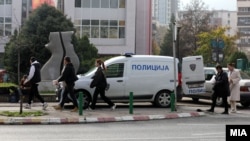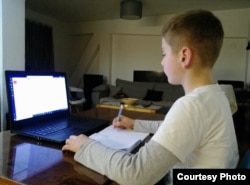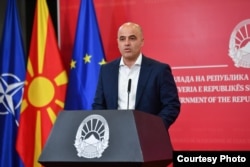SKOPJE -- In Moliere's theatrical classic Tartuffe, a household is nearly torn apart by a courtship based on a hoax. The title character, an interloper, fakes religious virtue to win the affections of his hosts' daughter.
The interplay of its 2,000 lines of rhyming couplets is a study in playful subtlety in the original French, never mind in Macedonian translation.
It's an aspect of learning that high-school teacher Biljana Kostkova says is impossible to capture through a computer screen.
"We had a dramatization of excerpts from the play Tartuffe so that students could hear the text, see the characters, see what acting is, what a play is, so those reading the roles could get into them," Kostkova, who teaches Macedonian language at Nikola Karev High School in Skopje, told RFE/RL's Balkan Service. "But that benefit can't be captured and realized through distance learning."
The limitations and pressures of online teaching are added challenges being heaped on teachers, students, and parents in North Macedonia after an outbreak of bomb threats that routinely send children and educators scrambling for safety until police bomb sweeps can be conducted, usually spelling the loss of another day of school.
Following Russia's full-scale invasion of Ukraine in February 2022, Balkan countries, including North Macedonia, Serbia, and Montenegro, have been targeted with bomb threats, which are often directed at schools.
"Students lose that aspect of teaching," Kostkova said of distance learning, which was mostly unheard-of at the primary and high-school levels before the COVID-19 pandemic forced teaching, work, and many other facets of life around the world online in 2020.
The specter of a forced return to virtual classrooms is just part of the problem posed by the bomb hoaxes in North Macedonia. Shopping malls and hospitals are feeling the pain, too, of the mostly unexplained wave of threats that officials have only indirectly blamed on Russia.
But the disruption to schools packs a particularly potent punch to the schedules and psyches of working parents, frustrated educators, and a young generation of Macedonians already scarred by lockdowns during a global pandemic.
Weeks Of Lost Learning
Classes in the squat, gray, brutalist buildings of Nikola Karev High School are some of the most severely affected with near-daily threats. However, they're far from the only ones.
After abating last summer, the deluge of bomb threats at Macedonian schools spiked again in October 2022 after a return to classes and has seemingly intensified.
One day last week, police in Skopje evacuated 14 schools on the basis of an e-mailed threat. A day earlier, officials said that hoaxes affected more than 60 schools, including a kindergarten.
The Union of Secondary School Students estimated recently that, in the first half of the current academic year, some 10 weeks of class has been lost to such hoaxes.
At some of the schools most frequently targeted by the threats, the union said, the suspensions and cancellations have derailed three out of every five days in the classroom.
No explosives have been found in connection with any of the resulting 400-plus evacuations and sweeps in North Macedonia.
Authorities have already announced an extension of the school year to mid-June to compensate for a prolonged winter break aimed at saving on heating costs driven up by the global energy crisis sparked by the Ukraine war.
This week, the Education Ministry advised primary- and secondary-school directors to organize distance learning for days interrupted by bomb threats. Online teaching is better than no teaching at all and helps keep teachers and students safe, the ministry reasoned.
Big Problems For Little Kids
Particularly in light of experience during the pandemic, parents in North Macedonia say there are added complications for younger pupils and their parents.
Marina, the mother of a third-grader in Skopje who didn't give her last name, said she worried about the psychological effects of constant reminders of possible danger.
"Every ringing of the bell five times causes them stress, and they ask, 'Why do they do this?'" she said. "I think it will be necessary to work a lot with the students after such events, so it doesn't have any lasting consequences on the children's mental health, because unfortunately this has been happening for months and affects the psyche of both children and some adults."
She said the situation also places parents in a near-constant holding pattern. Marina recalled how during the pandemic she and other parents "managed as best we could" before invariably being called to pick up their young children and trying to find childcare or just "asking for understanding from work."
"It's really difficult for many parents to organize," she said. She noted the added challenge for some families of ensuring computer and Internet access for multiple children.
"I think we'll face the same problems as during the COVID pandemic and will find that things haven't moved on in recent years," she said. "I doubt much work has been done to improve online teaching, and I'm skeptical that even if there's online teaching it will always be what it should be."
Russia Under Suspicion
The perpetrators of the bomb threats, which have likely spawned copycats, are not publicly known. North Macedonia Interior Minister Oliver Spasovski has described the hoaxes, which began after Russia's invasion of Ukraine last year, as "hybrid terrorist attacks" emanating from abroad.
AP quoted one of the recent threats as accusing Macedonians of being "complicit in the destruction of my country" and demanding an end to unspecified sanctions.
The war in Ukraine has tested loyalties and resilience, particularly among countries with historical ties to Russia that are still aspiring to EU or NATO membership or have only recently joined.
North Macedonia joined NATO in 2020, and it has been widely regarded as a leading EU candidate despite outlying challenges from EU members Greece and, more recently, Bulgaria.
Tensions between Skopje and Moscow have deteriorated as Macedonian integration efforts with the West accelerated following the breakup of Yugoslavia in the early 1990s.
In March of last year, Moscow put North Macedonia on its list of "unfriendly countries," which was expanded dramatically after Skopje joined Western sanctions to punish Russia for its invasion of Ukraine.
North Macedonia's prime minister, Dimitar Kovacevski, and other senior Macedonian officials have avoided directly blaming Moscow or Russians publicly for the deluge of bomb threats.
But Kovacevski this month linked them and very recent cyberattacks to Russia's war on Ukraine.
Interior Minister Spasovski has also said that officials have a good idea of their origins and are working with Skopje's NATO "partners" on the problem.
Digital anonymity has reportedly thwarted the overwhelming majority of Macedonian investigations in the past year, with a handful of notable exceptions allegedly involving student perpetrators.
'Normal' But 'Not Normal'
The Union of Secondary School Students, which is tracking lost classroom time, has cautioned that online teaching cannot become a substitute for all aspects of the education process.
"Dealing with the lost teaching has so far been left to the schools and teachers," the union's president, Luka Pavicevic, told RFE/RL's Balkan Service. "But a distinction should be made between online teaching as additional teaching for what was lost and what the [Education and Science Ministry] is offering -- that is, online teaching as a replacement for the entire educational process."
Meanwhile, Kostkova and the other teachers at the country's roughly 1,200 primary and secondary schools continue to struggle to make up for lost time in the classroom, although they and their students are by now used to the drill.
"In the beginning, we were taken aback. The parents were afraid for the safety of the children and the arrival of the students was a waste of time," she said.
Teachers and children have to dash home, she said, and it can take a while before some of the slowest students rejoin their classmates online, especially if passwords are "forgotten."
Students were initially frightened by the bomb threats, Kostkova said, but at this point "it has become normal, which is not normal."












